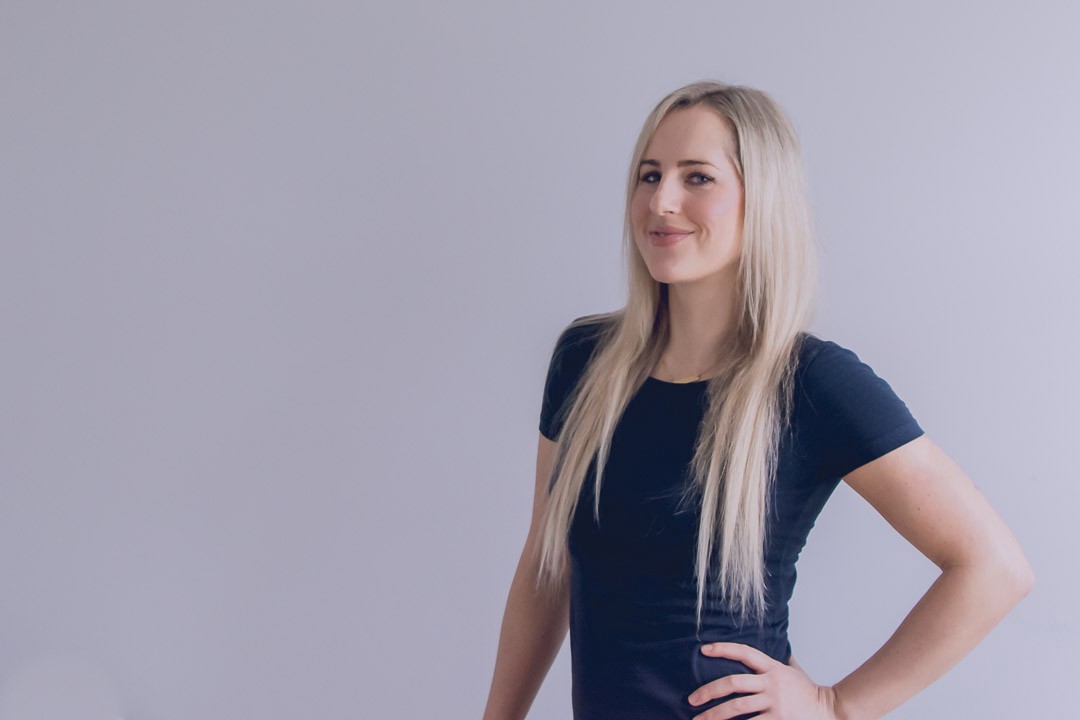As a part of my series about “Mental Health Champions” helping to normalize the focus on mental wellness, I had the pleasure to interview Megan Bruneau, M.A. RCC, a therapist, executive coach, podcast host, writer, and speaker. Open about her personal mental health challenges, precarious dream-chasing in New York City, and #datingin2019, Megan is redefining what it means to be a therapist — and a human. A no-bullshit voice in the “white yoga girl” space, you’ll never hear Megan tell you to “Think positively” or “Be grateful for what you have.” Once paralyzed by anxiety, depression, and eating disorders, she advocates for normalizing the messy human experience and learning to like yourself in a society that profits off of self-loathing. Appearing in Forbes, HuffPost, Quartz, LifeHacker, MindBodyGreen, Well + Good, The New York Post, Good Morning America, Bustle, Entrepreneur, and more, Megan’s articles, posts, and podcasts have garnered tens of millions of views.
Thank you so much for joining us! Can you tell us the “backstory” about what brought you to this specific career path?
I have a sterilized version of this story, where I say I’ve just always been fascinated with psychology and helping. I remember a clear conversation with my dad at about seven or eight years old, where I decided I would be a psychologist (after he killed my dreams of being a singer songwriter, artist, and journalist, respectively *sigh*). This version is not untrue, but like most therapists the full story is that my curiosity about the human condition grew out of personal experience with pain.
My parents went through a super messy separation when I was in third grade, and I found myself in a “parentified” role (when a child learns to focus on a caregiver’s needs), and I became a de facto therapist to my mom. As a result, I grew up young and learned to become deeply attuned to others’ emotions. I also fused “love” with “helping” and “feeling needed” — a wonderful and terrible combination that’s unsurprisingly common in helping professionals. Then, in my teenage years, I struggled with bulimia, depression, and anxiety (and today I recognize I was an extremely anxious child as well) — all driven by the shame-based perfectionism I now help my clients transform. I had so much shame and fear around my bulimia, and thought if I became an expert in psychology I could overcome it.
Finally, when I was 18 I got in a car accident that left me physically unscathed but with a PTSD diagnosis, and within my distress there was added curiosity and frustration about myself that made the profession a no-brainer. I set myself up to get into a masters program right out of my undergrad, and after plowing through seven years of post-secondary (ironically graduating when my depression and eating disorder — which had become anorexia — were at their worst) began working at a college. After noticing themes in my clients and feelingl like I had a window into the human condition, I started the blog that ultimately took me to NYC and was the beginning of my soapbox — er, I mean brand.
According to Mental Health America’s report,over 44 million Americans have a mental health condition. Yet there’s still a stigma about mental illness. Can you share a few reasons you think this is so?
I have many thoughts on this, so bear with me. It my opinion, it first begins with language. I’m not talking about NLP or rewriting “the stories we tell ourselves.” I’m talking about the pathologizing of common human experience by labeling it as “mental illness” or “mental disorder.” [Social] media and our sociocultural narratives misrepresent the human experience with promises of “Happily ever after” and unwavering, enduring states of happiness if we just learn to “Think positively!” or reach our goal weight or get a big diamond ring or renovate our kitchen.
The belief that we’re “human-ing wrong” because we feel difficult emotions (which are evolutionary and responsible for our survival for hundreds of thousands of years) leads us to seek material items, milestones, and medication to alleviate our discomfort. Sometimes that medication comes in the form of food, booze, social media, Bumble, and “productivity,” other times that medication comes in the form of the gross and reckless over-prescription of psychopharmaceuticals (“Tell us how you really feel, Megan!”).
By labeling normal human responses to abnormal human circumstances as “illness,” we situate the root-cause within the individual and evade responsibility as a society. Instead of acknowledging social and systemic issues — recognizing that most people with “mental illness” are isolated, financially compromised, overworked in unfulfilling jobs, stressed, marginalized, traumatized, under-slept, overleveraged, undernourished, sedentary, and deprived of nature and play — we get to point at the individual and say, “You have a mental illness. Go see a psychiatrist and get your neurochemistry straight.”
Now look, as a clinician I’m definitely notagainst medication. I’ve had and have many clients who benefit greatly from access to pharmacological intervention, and for populations who have little access to comprehensive mental health support it can be lifesaving. But what I am against is over-prescription and medicating away the feelings that are there to tell us something. The fastest way to create “mental illness” in someone is to overwhelm them with stressors and take away their resources, and as long as we lump BEING A FUCKING HUMAN into the category of “mental illness” we perpetuate stigma. I think if we were to start using the term “mental health challenges” and look at every individual’s experience through a systemic lens, we would see that mental health challenges are human — just like physical health challenges. And just like physical health challenges, sometimes medical intervention is necessary and helpful and other times it’s not. And course of treatment should be free of stigma and irrelevant to anyone not directly involved.
Second — and this is a shorter one — EVERY time there is a mass shooting we blame it on “mental illness.” Every time! How do we expect to destigmatize a term like that when we’re associating it with mass homicide? Of course, this is another place where “mental illness” becomes a scapegoat — evading conversations around gun control and bullying and education. Once again, we place the blame within the individual rather than acknowledging it’s a social issue.
And finally, I think we’re very confused in how we ought to be best advocating and destigmatizing. There are such mixed messages out there, undeniably politically informed. For example, we hear things like “Mental illness is not your fault! X individuals suffer!” implying it’s largely out of our control. We encourage people to own and embrace labels, yet simultaneously we tell them that they can heal and “It gets better” and no longer being [insert condition here] is a triumph. Which is it? Am I supposed to accept my “diagnosis” (which is not like diagnosing a broken bone and misdiagnosis is rampant) as out of my control, put it in my IG bio and valiantly advocate for destigmatizing while managing my symptoms? Or am I supposed to do everything from EMDR to acupuncture to ayahuasca to yoga to inner child work (yes I’ve done these all and then some) and hope that one day I no longer fall into the “clinical” category? As long as we’re selling the illusion of sustainable weight loss, people are going to keep dieting and fat stigma will remain. And as long as we’re selling the illusion of healing from mental illness, people are going to keep searching for a silver bullet or an elusive “happiness” and stigma around mental illness will remain.
Can you tell our readers about how you are helping to de-stigmatize the focus on mental wellness?
I do several things. First, I’m very open about my own past and present mental health struggles on the internet. Given I’m a therapist, this garners mixed opinions. Many people see it as unethical, that I would self-disclose so much. But from what my clients tell me, it’s actually what makes them want to work with me — not a deterrent. There was a time when mental health professionals were supposed to appear as the Tabula Rasa — the blank slate and wise, proper, impenetrable “expert,” and some still embody that. But I say fuck that shit. The technological revolution, particularly social media, has left us more connected yet more socially disconnected than ever before. Isolated, we compare ourselves to a fake reality where it seems like everyone else — but us — has it all together. My message to my clients (and the world) is, “I don’t have it all together! I don’t have it all figured out! And some days and moments are beautiful and connected and other days and moments are dark and hard and lonely and that’s what life is. You are not broken because your life doesn’t look like a lifestyle blogger’s or the subject of the romcom you just watched. You are human and worthy and life can still be magical not in spite of its pain, but because of it.” I share the messy aspects of my journey as a single, millennial woman following her heart and dreams both on Instagram and in hundreds of articles I’ve written for publications like HuffPo. MindBodyGreen, and Forbes.
Second, I “infiltrate” the largely white, affluent, male audience of Forbes by publishing interviews with founders open about their mental health struggles or writing mental health articles framed as “success hacks.” This allows me to get outside the echo chamber and reach people who don’t read The Mighty.
Finally, I have a podcast called The Failure Factor: Stories of career perseverance, and on it I interview people about the past and current challenges. While the focus is career challenge and resilience, our conversations inevitably touch on the personal as well. My hope with these conversations is that they normalize listeners’ experiences of challenge and pain, and reduce shame enough to inspire them to reach out to (and build) communities of connection and support.

Was there a story behind why you decided to launch this initiative?
I’ve always felt a responsibility to share my story. I’m very aware of my privilege: being white, able-bodied, heterosexual, cisgender, English-speaking, thin, self-employed, and educated, I’m both exempt from the layers of oppression many individuals with mental health challenges are vulnerable to — and for better or worse, people listen to me. So knowing I have this power and voice, I think it’s irresponsible notto use it to destigmatize and advocate. I’d be lying if I said I don’t care what people think — I’m human and I’m not a fucking sociopath. But I’ve always had a pretty solid perspective on what’s important, and to me knowing I’m having an impact is totally worth the trolls, haters, and dudes I date who run in the other direction after my Instagram gets leaked.
With Forbes and The Failure Factor, it just seemed like such a beautiful opportunity to disrupt a vertical that’s traditionally viewed vulnerability as weakness and omitted mental health from the conversation. Much of my education was framed in narrative and social norm theories, and I recognize how changing the narrative is necessary for changing social norms — and so I try to do that both personally with the stories I create.
In your experience, what should a) individuals b) society, and c) the government do to better support people suffering from mental illness?
Re: individuals, I think those of us who can share our experiences without much repercussion (i.e. those of us who feel supported and who won’t endanger our lives, lose our jobs, be disowned by family members, or experience discrimination beyond what our coping can tolerate), should. I’m not just talking about experiences with “mental illness’; I’m talking about experiences being an imperfect, fallible, and sometimes flailing human being. Let’s stop FaceTuning our faces and our lives on and offline, and paint a more accurate representation of the beautiful messes we’re all navigating. And I think another way those individuals who don’t struggle can support others is by recognizing we all play a role in the collective mental welfare. The kid who shoots up the school because he was bullied? What role does the bully play in that “mental illness?” The parent who tells their child “Big boys don’t cry” or abuses or neglects them? What role does that parent play in the child’s resultant anxiety and depression? Just because an individual might not personally deal with mental health struggles, it doesn’t mean they don’t play a role in others’. We can’t live our lives trying not to step on toes or coddle others’ from the inevitable traumas of daily life; however, we can do our best not to be assholes.
Re: society in general and government initiatives, we have accept the systemic intricacies of “mental illness.” We have to accept that marginalization and the way our society functions breed “mental illness.” For example, a single mother working two jobs for minimum wage stands little chance for mental health optimization. Seeing a therapist is an hour away from her kids who she barely sees, let alone can she afford (plus the additional childcare). She’s sleep-deprived and malnourished, disconnected and can’t afford the “self-care” many of us can. When she is present with her kids, she’s too depressed to be attuned to them. Their physical and emotional needs unmet, they struggle in school and begin showing symptoms of anxiety and depression themselves. This is just one example of how socioeconomic circumstances create and perpetuate “mental illness,” but if you look at each example through a wider lens, you begin to see the societal roots. Our competitive, comparative culture that views independence (emotionally and physically) as aspirational perpetuates the very isolation, shame, and burnout that creates mental health challenges in the first place.
I don’t know what the governmental answer is. I don’t think it’s handouts — maybe there’s potential in universal basic income but I’m also aware of how often depression is existential in its nature — rooted in a lack of meaning UBI won’t solve. I of course would love to see increased access to mental health resources (individual and group), but I still think we can do one better. We currently look through the lens of intervention, and that makes sense given depression is the leading cause of disability and we do need to take intervening action; however I think we’re not paying enough attention to universally bolstering areas that lend to mental health — namely: connection (any other singles wanna start living communally?), meaningful work, exercise, nutrient-dense diets, self-care and play, self-awareness and self-compassion, responsible substance use, flexible work hours to optimize sleep, empathy and emotional-intelligence training in schools, improved access to childcare, and more nature up in our lives. I genuinely think we need to create new cultural norms and infrastructure to upgrade the human experience, and I haven’t figured out how that can be achieved within our current political system. But I’m working on it, and I’ll keep you posted.
What are your 6 strategies you use to promote your own wellbeing and mental wellness? Can you please give a story or example for each?
- Exercise: Exercise is my antidepressant and antianxiety medication. There was a long time, back when I was struggling with eating disorders, that it came from a punishing place. But today that’s not the case, and movement keeps me grounded, focused, and sleeping soundly. I’m a die-hard Class Pass junkie, play soccer weekly, and have recently discovered a dance cardio class I’m obsessed with.
- Social connection: Whenever I feel depression nipping at my heels, it’s usually correlated with feeling disconnected. Isolation breeds shame, and shame breeds isolation, so it can be tough to break this vicious cycle. Yet I have enough awareness now that I know to push through the discomfort and reach out to friends (I’m incredibly lucky to have very good friends whose arms — or iPhone screens — I can surrender into during rough times).
- Body-centered, meditative practices (Yoga, walking, massage, dance, acupuncture, therapy, music): There’s so much research supporting the mind-body connection, and how increased interoception (bodily awareness) is correlated with stronger vagal nerve tone and thus lower instances of anxiety and depression. Only in the past few decades have we really begun to learn mental health transcends far beyond “the mind” — or at least the brain-situated mind we think of. From serotonin production in our gut, to stress and diet-related inflammation, to impaired autonomic nervous system activity due to trauma, bodily awareness and bodywork are necessary to positive mental health. I do a ton of yoga, get acupuncture and massage regularly, see a somatically-informed therapist, and walk 5–10km almost every day #newyork.
- Self-compassion: Learning self-compassion (a highly research-supported technique for relating to one’s internal experience) completely changed my life. High-level, self-compassion is treating yourself with the same compassion you would a friend or loved one. It’s a combination of three things, according to the leading researcher on the topic, Kristin Neff: 1) Mindfulness: the intentional, nonjudgmental awareness of the present moment — including thoughts, feelings, and sensations; 2) Self-kindness: empathizing with yourself and saying what you would to someone you love; and 3) Common humanity: relating your experience of suffering to the common human experience, and understanding that we’re “all in this together.” As an example, #datingin2019 I experience a ton of rejection and disappointment. If I respond to my heartache with something like, “Megan, you went on three dates with the dude! Get over it! Stop being so weak — he’s not worth your tears!” I’m now not only feeling heartache, I’m also feeling shame and anxiety and loneliness in my experience. Instead, if I say something like, “Megan, Sweetheart! Ouch that hurts, doesn’t it? You really liked him and were excited about the connection you experienced. It makes total sense that you’re feeling rejected and disappointed right now, and that your heart is aching. Remember that ‘Rejection is protection,’ and he clearly wasn’t your dude, and there’s a lesson that will unfold out of this. Also, #datingin2019 is some spiritual shit and there are millions of others out there right now feeling something similar.”
- Saying “No”/Setting Boundaries, Including A Nothing before 10am rule: One of the strategies I don’t think we talk about enough relating to mental wellness is doing LESS. We’re always like, “Journal! Meditate! Drink celery juice! Join a club!” Yes, these things are all important and can be super helpful, but what we don’t talk about enough is saying “No.” I often remind people that “Saying no is saying yes to yourself.” As an example, I have a “Nothing beore 10am” rule — where I say “No” to anything before 10am and say “Yes” to sleep. I’ve always been both a night owl and a chronic insomniac, and knowing I had to get into an office early in the morning gave me so much anxiety every night and worsened my already suboptimal sleep. So I decided to say “fuck it” to trying to be a morning person, or having a “morning routine,” and I owned the fact that you will never get me to commit to anything prior to 10am unless it’s a flight. I’ve also owned the fact that I love Vegas, spicy margaritas, and dating. Fight me.
- Thinking about death: I reflect on death a lot. I’ve very aware of my mortality and sometimes this falls into a very uncomfortable “death anxiety” place. But for the most part, it gives me a great deal of perspective and keeps me grounded when life feels chaotic or hard. I think about how nothing really matters and no one really cares, and we’re all just here freaking out about meaningless shit a lot of the time. It’s not nihilistic — more liberating and for me takes the pressure off. When you think about how you could be involved in an accident and no longer exist at any moment, it’s an avenue to gratitude for all experiences on this earth — even the painful ones.

What are your favorite books, podcasts, or resources that inspire you to be a mental health champion?
To be honest, most of the “mindset” and motivational stuff out there doesn’t resonate with me. Historically I’ve consumed a lot from Pema Chodron (“When Things Fall Apart” was a gamechanger for me), Thich Nhat Hanh, and Alan Watts. Man’s Search For Meaning by Viktor Frankl also completely changed my perspective on mental health. So did learning about attachment theory (“Attached” is a good starter resource on this one) and polyvagal theory (“The Body Keeps The Score” is a good one for this). In recent years, I’ve been a big fan of Kristin Neff, Kelly McGonigal, Ron Siegal, Peter Levine, Bessel Van Der Kolk, Gabor Mate, and Susan David — they’re all brilliant and legit. As far as podcasts go, I love Food Psych with Christy Harrison and Shrink Rap Radio with David Van Nys, but I tend to just search whatever mental health expert I’m craving more info from and seek out there interviews.
Thank you so much for these insights! This was so inspiring!


